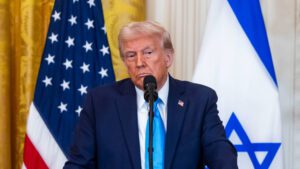Washington D.C. – United States President Donald Trump has set his sights on resolving the Pakistan Afghanistan conflict, marking what he claims would be his eighth war resolution within the first year of his second administration. The announcement came as Trump departed for Israel to oversee the hostage release following his brokered ceasefire in Gaza.
Escalating Border Tensions
The Pakistan Afghanistan conflict has intensified significantly, with both nations engaging in heavy cross-border fire along their shared frontier. Taliban forces responded forcefully to Pakistani airstrikes in Kabul, triggering a dangerous escalation that has captured international attention and prompted Trump’s intervention interest.
According to Afghan spokesperson Zabihullah Mujahid, Afghanistan’s Taliban forces attacked Pakistani security personnel during overnight border operations, reportedly killing fifty-eight soldiers. Meanwhile, Pakistani officials claimed their forces successfully took control of approximately nineteen Afghan posts along the shared border, though they did not confirm any casualties on their side.
The Pakistan Afghanistan conflict has reached a critical juncture, with major border crossings between the two countries closed on Sunday as clashes continued to intensify following Taliban accusations that Islamabad carried out airstrikes in Kabul.
Trump’s Confidence in Peace-Making Abilities
Speaking to reporters while departing for the Middle East, Trump expressed confidence in his ability to resolve the Pakistan Afghanistan conflict upon his return from Israel. “This will be my eighth war that I have solved, and I hear there is a war now going on between Pakistan and Afghanistan. I said, I’ll have to wait till I get back. I am doing another one. Because I am good at solving wars,” Trump stated.
The President’s remarks reflect his growing reputation as a mediator in international disputes, following his recent success in brokering the Gaza ceasefire. Trump’s approach to the Pakistan Afghanistan conflict will likely draw on strategies employed in previous peace negotiations.
Track Record of Conflict Resolution
Trump emphasized his extensive experience in resolving long-standing international disputes, including the historic peace agreement between India and Pakistan. The President highlighted the longevity of conflicts he claims to have resolved, suggesting his expertise makes him uniquely qualified to address the Pakistan Afghanistan conflict.
“Think about India, Pakistan. Think about some of the wars that were going on for years. We had one going for 31, one going for 32, one going for 37 years, with millions of people being killed in every country and I got every one of those done, for the most part, within a day. It’s pretty good,” Trump said, showcasing his rapid conflict resolution approach.
The President’s mention of resolving disputes “within a day” suggests he may attempt a similarly swift approach to the Pakistan Afghanistan conflict, though the complexity of Taliban involvement and historical tensions may present unique challenges.
Also Read: Gaza War Over: Trump’s Bold Middle East Peace Mission Begins
Lives Saved Through Diplomacy
Trump framed his peace efforts as primarily humanitarian, emphasizing the lives saved through his diplomatic interventions rather than seeking personal recognition. This perspective may influence his approach to the Pakistan Afghanistan conflict as well.
“It’s an honour to do it. I saved millions of lives. In all fairness to the Nobel Committee, it was for 2024. This (Nobel Peace Prize) was picked for 2024. But there are those who say you could make an exception because a lot of things happened during 2025 that are done and complete and great. But I did not do this for the Nobel. I did this for saving lives,” Trump stated.
Nobel Peace Prize Disappointment

The President’s comments came shortly after his hopes for the Nobel Peace Prize were dashed on Friday when the award was presented to Venezuelan opposition leader Maria Corina Machado. Despite the disappointment, Trump maintained that his motivation for resolving conflicts like the Pakistan Afghanistan conflict stems from humanitarian concerns rather than award recognition.
Trump suggested that the Nobel Committee might consider making an exception for 2025 achievements, given the significant peace deals completed during the current year, though he insisted his diplomatic efforts were not driven by prize considerations.
Current State of Border Crisis
The Pakistan Afghanistan conflict has created a humanitarian and security crisis along one of the region’s most volatile borders. The closure of major border crossings has disrupted trade and movement, affecting thousands of civilians caught between the escalating military operations.
Taliban forces’ aggressive response to Pakistani airstrikes demonstrates the fragility of relations between the two nations and the potential for further escalation without international intervention. The Pakistan Afghanistan conflict represents a complex challenge involving historical grievances, security concerns, and competing national interests.
Strategic Implications
Trump’s interest in mediating the Pakistan Afghanistan conflict aligns with his broader Middle East and South Asia peace strategy. His upcoming visit to Israel and subsequent peace summit in Egypt may provide diplomatic momentum that could be applied to the Afghanistan-Pakistan situation.
The resolution of the Pakistan Afghanistan conflict would significantly enhance regional stability and potentially open new avenues for economic cooperation and counter-terrorism efforts. However, the involvement of Taliban forces and Pakistan’s security concerns present unique obstacles that differ from Trump’s previous peace negotiations.
As Trump completes his Middle East mission, the international community watches to see whether his self-proclaimed peace-making abilities can indeed bring an end to the Pakistan Afghanistan conflict and restore stability to this troubled border region.

